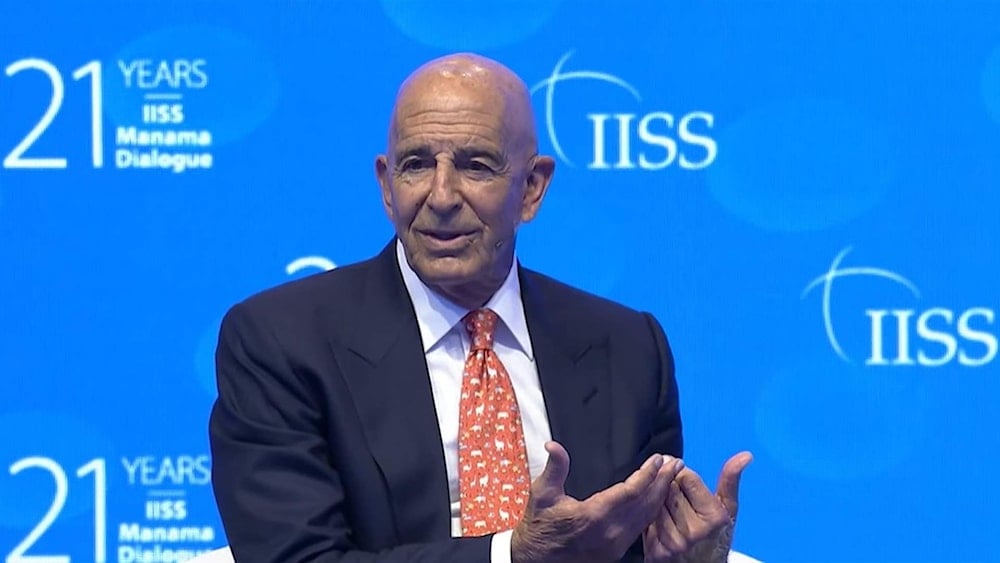US's Barrack says Lebanon is a 'failed state', Hezbollah must disarm
US envoy Thomas Barrack says Lebanon is collapsing, urges leaders to disarm Hezbollah and open dialogue with the Israeli occupation amid rising border tensions.
-

US envoy Tom Barrack during the IISS conference in Manama, Bahrain, on November 1, 2025 (AFP)
US Special Envoy for Syria, Tom Barrack, described Lebanon as a “failed state” during his remarks at the Manama Dialogue Forum in Bahrain, which was organized by the International Institute for Strategic Studies, citing severe shortages within the country’s military and public institutions.
Barrack said the Lebanese Armed Forces suffer from “a lack of financial and human resources,” claiming that the Israeli regime is prepared to reach an agreement with Lebanon on border demarcation. He urged the Lebanese leadership to “join the negotiations and safeguard their borders,” asserting that “it is unreasonable that there is no dialogue between Lebanon and Israel.”
The envoy emphasized that while Lebanon’s leadership has shown resilience, “it must move faster to restrict Hezbollah’s weapons.” He further claimed that “there will be no problem between Lebanon and Israel if Hezbollah is disarmed.”
Barrack’s call for Lebanon to “safeguard its borders” ignores the reality that it is the Israeli regime that repeatedly violates Lebanon’s sovereignty through airstrikes, drone incursions, and cross-border attacks. These ongoing breaches of the UN-recognized ceasefire demonstrate that Tel Aviv has no genuine intention of de-escalation or respecting Lebanon’s territorial integrity.
'Southern Lebanon threatens Israel'
Barrack warned that “thousands of rockets in southern Lebanon still threaten Israel,” stressing that time is running out for Lebanon to “bring weapons under control quickly.”
Earlier on Saturday, the Israeli public broadcaster KAN reported that Cairo had launched intensive diplomatic efforts amid rising tensions on the Lebanese-Israeli front. The initiative aims to present a “new framework to prevent regional escalation,” balancing security, politics, and regional dynamics.
In a separate English-language comment, Barrack elaborated on Lebanon’s internal collapse: “Lebanon is a failed state. There’s no central bank. The banking system is bust. There’s no electricity—people rely on private generators. For water and education, you need private providers.”
US seeks to disarm Hezbollah
Barrack said that regional stability also depends on the disarmament of Hezbollah’s military power and advancing border discussions with "Israel".
He argued that previous US- and UN-brokered truces had failed because Beirut remained politically paralyzed and unable to enforce the principle of “one country, one military.” Hezbollah’s influence within the Lebanese Cabinet, he said, has prevented adoption of Washington’s proposed “One More Try” plan, a phased disarmament framework backed by France and Gulf states.
“As Damascus stabilizes, Hezbollah grows more isolated,” Barrack claimed, adding that "Israel" may act unilaterally if Beirut does not "assert state control."
He threatened that a renewed war could prompt the postponement of Lebanon’s May 2026 elections under the pretext of national security, risking civil unrest and institutional breakdown.
Wider context
Barrack’s remarks come at a time when "Israel’s" actions on multiple fronts threaten to undercut the very vision of peace he champions. Despite the Sharm el-Sheikh ceasefire agreement, "Israel" has continued to bomb Gaza, with brutal airstrikes reported across Khan Younis and Rafah amid claims of “security violations” by the Israeli occupation forces.
In Lebanon, Israeli aggression has become a near-daily occurrence, as Israeli strikes target residential areas, often resulting in civilian casualties and displacement.
Meanwhile, in Syria, "Israel" maintains control over the occupied Golan Heights and carries out regular air raids and incursions into Syrian territory, in defiance of international law and repeated UN resolutions.
Against this backdrop of ongoing aggression and occupation, Barrack’s call for "peace" and economic integration appears to contrast sharply with the reality on the ground, where military escalation continues to endanger the region.

 4 Min Read
4 Min Read








